Decision Spread
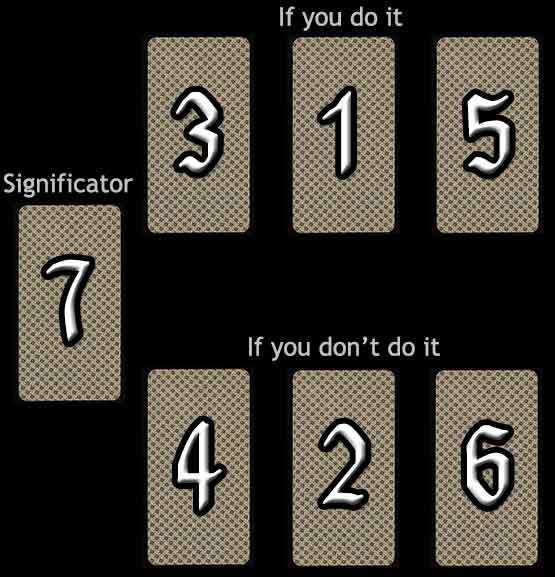
Difficulty: Easy
This simple but highly useful spread calls for a question to be asked in this format:
'What happens if I do (X), and what happens if I do not do (X)?'
Please note that it should not be viewed as a decision between two different options, but about whether a single option should be exercised or not. A second option would call for a separate reading.
Card #7 is the significator, the overall theme of the query.
Cards #3, #1, & #5 represent the chronological sequence of events that occurs if the reader chooses to do (X).
Cards #4, #2, & #6 represent the chronological sequence of events that unfolds if the reader chooses not to do (X).
Your Decision Reading
The Significator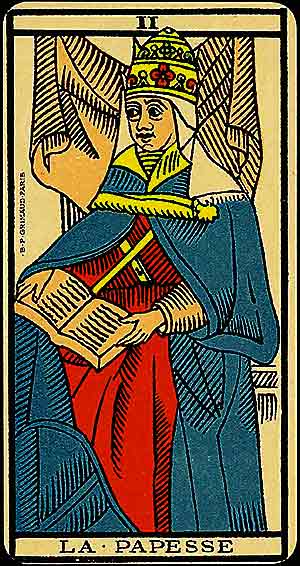 II – The Priestess (La Papesse) |
Outcome if you do it: | ||
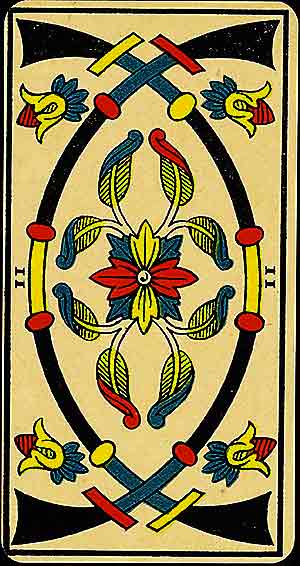 Deuce of Swords |
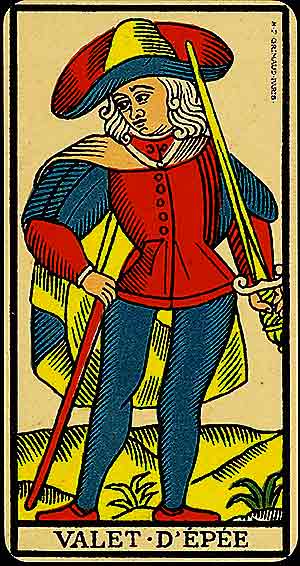 Valet of Swords |
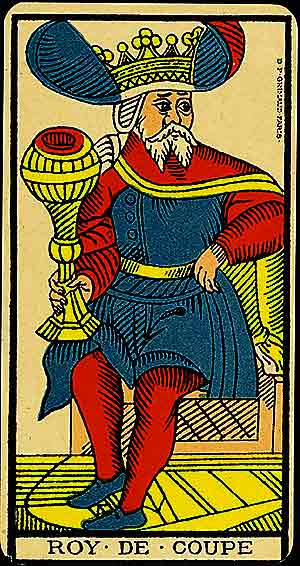 King of Cups |
|
| Outcome if you don't do it: | |||
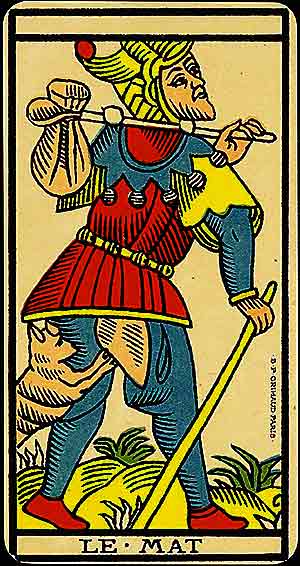 0 – The Fool (Le Mat) |
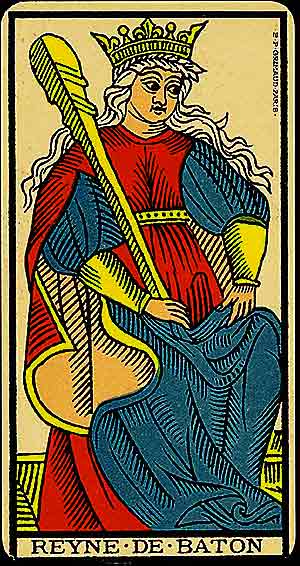 Queen of Batons |
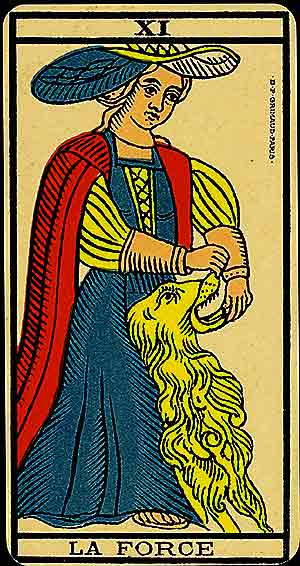 XI – Strength (La Force) |
|

II – The Priestess (La Papesse)
The High Priestess is the keeper of wisdom and the custodian of sacred knowledge. She represents introspection, patience, and the search for truths hidden beneath the surface.
Symbolism: Seated and serene, the High Priestess holds an open book, symbolising esoteric teachings and mysteries revealed through disciplined study. Her veil represents the boundary between the seen and unseen, while the calm symmetry of her setting reflects inner equilibrium and balance.
In Relationships: Emotional depth and the unfolding of hidden dynamics. This card encourages trust in intuition over appearances.
In Work: A time for reflection and strategy rather than direct action. The answers lie in careful analysis.
Spiritually: The High Priestess invites the seeker to embrace silence and meditation, revealing the wisdom that resides within.
When ill-dignified: Stagnation, secrecy, or confusion. It warns against ignoring inner guidance or withholding necessary truths.
Outcome if you do it:

Deuce of Swords
The Deuce of Swords symbolises balance, duality, and the tension of decision-making. It represents a moment of stillness before action, where the mind seeks clarity amidst opposing forces.
Symbolism: Two curved blades cross symmetrically, forming a stable yet tense arrangement. The floral designs in the space between them suggest that harmony can emerge through directed thought and balance.
In Relationships: A crossroads where choices must be made, often involving compromise or addressing hidden issues.
In Work: A need to weigh options. Progress depends on thoughtful analysis and avoiding haste.
Spiritually: The card reflects the need to reconcile inner dualities to achieve mental and emotional peace.
When ill-dignified: Indecision, avoidance, or emotional detachment. It warns against stagnation or failure to confront the truth.

Valet of Swords
The Valet of Swords represents intellectual curiosity, a keen sense of observation, and the exploration of new ideas. He encourages vigilance and the willingness to learn, while reminding us to think before acting or speaking.
Symbolism: The Valet stands alert, holding a sword with both readiness and caution. His posture reflects an eagerness to explore new knowledge and ideas, while the open background suggests the vast potential of untapped intellectual pursuits.
In Relationships: This card suggests a need for honest and thoughtful communication. It can indicate the start of a new dynamic or the discovery of deeper truths within a connection.
In Work: The Valet encourages taking the first steps towards learning or developing new skills. It signifies a time to research and remain open to innovative ideas.
Spiritually: The Valet reflects the early stages of a mental or philosophical journey, urging you to approach truths with curiosity and discernment.
When ill-dignified: Hasty judgements, miscommunication, or intellectual arrogance. It warns against speaking without thinking or neglecting critical observation.

King of Cups
The King of Cups represents emotional balance, wisdom, and leadership. He embodies the ability to guide others with kindness and understanding while maintaining his own emotional stability.
Symbolism: Seated on his throne with a serene expression, the King holds a cup, symbolising emotional authority. The structure around him reflects his connection to intuition and emotional balance.
In Relationships: This card signifies a stable and emotionally mature partner or dynamic. It encourages fostering relationships built on mutual respect, trust, and emotional stability.
In Work: The King highlights leadership through emotional intelligence and wisdom. It suggests guiding others with compassion and remaining calm in challenging situations.
Spiritually: The King represents the harmony between intellect and emotions, urging you to channel your emotional stability into guiding yourself and others with integrity.
When ill-dignified: Emotional suppression, volatility, or manipulation. It warns against using emotional influence for selfish gain or allowing inner turbulence to disrupt your leadership.
Outcome if you do not do it:

0 – The Fool (Le Mat)
The Fool represents the untamed spirit and unshackled freedom of the soul. He wanders without boundaries, embodying movement, exploration, and detachment from worldly concerns. This card invites us to embrace change and unpredictability with courage and spontaneity.
Symbolism: The dog biting at the Fool's leg symbolises the tension between freedom and earthly constraints. His staff and bundle represent the burdens and wisdom accumulated on life's journey, carried with both carelessness and purpose. The colourful jester's attire signifies his eccentricity and adaptability, while his forward gaze reflects an openness to the unknown.
In Relationships: A new, unpredictable connection or the need for more spontaneity in existing relationships. Beware of recklessness.
In Work: Embarking on a risky or unconventional path, where intuition takes precedence over plans.
Spiritually: The Fool embodies the soul's leap into the vast unknown, trusting the divine order of chaos.
When ill-dignified: Naivety, poor judgement, or a lack of grounding. It warns of becoming aimless or distracted by superficial pursuits.

Queen of Batons
The Queen of Batons represents creative leadership, warmth, and the nurturing of ideas and relationships. She inspires confidence and demonstrates the power of blending intuition with action.
Symbolism: Seated on her throne with a commanding yet approachable presence, the Queen holds her baton with purpose. The aura of growth and vitality surrounds her, emphasising her connection to creativity and nurturing energy.
In Relationships: The card signifies loyalty, passion, and the deepening of bonds through mutual inspiration. It suggests a partner who brings warmth and confidence to the relationship.
In Work: It highlights leadership, creativity, and the ability to inspire a team or execute a vision with determination and grace.
Spiritually: The Queen calls for alignment with your inner fire, trusting your intuition to guide your creative and spiritual pursuits.
When ill-dignified: Overconfidence, manipulation, or burnout. It warns against using charm for selfish gains or losing balance in the pursuit of ambitions.

XI – Strength (La Force)
Strength symbolises the mastery of inner strength, courage, and the harmonisation of primal instincts with spiritual awareness. It teaches that true power lies in patience and understanding rather than brute force.
Symbolism: A figure calmly opens the jaws of a lion, symbolising the mental strength required to tame one's baser instincts. The figure's composed expression reflects confidence and inner control. The lion embodies raw energy and passion, while the gentle interaction suggests a balance between wildness and refinement.
In Relationships: Emotional resilience and understanding strengthen relationships. It may indicate a need for patience and compassion in matters of the heart.
In Work: Triumph through determination and calm perseverance. Success comes from maintaining focus and self-discipline.
Spiritually: Strength reflects the integration of instinct and higher consciousness, inviting you to connect with your inner power.
When ill-dignified: Impulsiveness, weakness, or unchecked aggression. It warns against letting fear or uncontrolled passions take the lead.